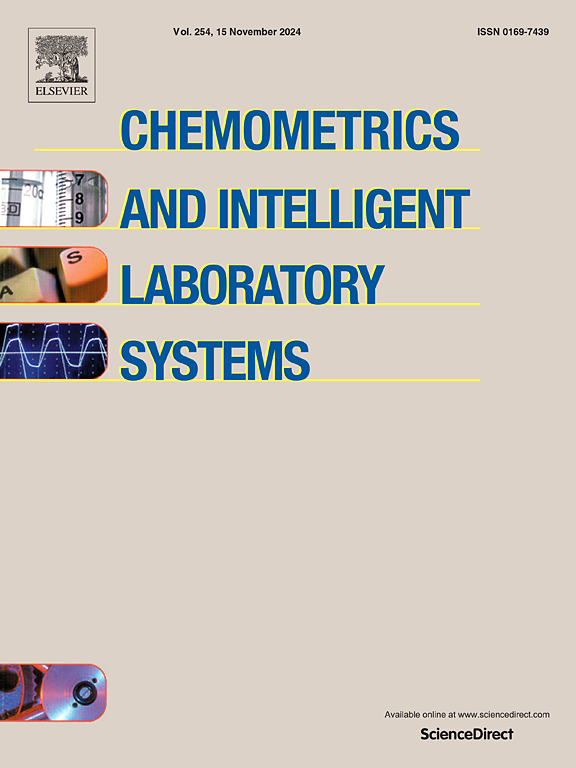Evaluation of n-component surrogate mixtures formulated for jet fuel physicochemical property predictions
IF 3.8
2区 化学
Q2 AUTOMATION & CONTROL SYSTEMS
Chemometrics and Intelligent Laboratory Systems
Pub Date : 2025-04-19
DOI:10.1016/j.chemolab.2025.105409
引用次数: 0
Abstract
Compression ignition (CI) engines operating on aviation fuels are sensitive to fuel property variation but can maintain robust ignition with inline, feedforward sensing and control. Due to the expensive and time-consuming nature of conventional fuel property testing methods, alternate methods like Quantitative Structure Property Relationship (QSPR) models have been developed, which link fuel properties to their molecular structures, but many fail to account for the complex intermolecular interactions in multicomponent mixtures like jet fuels. Recent studies have employed machine learning (ML) models trained on surrogate mixtures of jet fuels to predict fuel properties like the derived cetane number, density, and viscosity; and they show good performance. These surrogate mixtures, composed of hydrocarbons representing real fuel components, facilitate dataset generation for ML model training. However, the sufficiency of such datasets has not been studied exhaustively. This study investigates the sufficiency of datasets composed of jet fuel surrogate mixtures in predicting fuel properties for fuels beyond the training set. While dataset sufficiency does depend on the population and the property modeled, as a heuristic, we emphasize spanning the chemical functional groups present in likely mixtures and doing this with low correlation and high diversity in the chemical functional groups. A large dataset of surrogate mixtures was generated spanning the ranges of UNIversal Functional Activity Coefficients (UNIFAC) functional groups present in real jet fuels. This study establishes criteria for dataset sufficiency, suggesting a minimum dataset size for developing a robust ML model. We also report the tools and codes developed for determining the minimum number of surrogate mixtures needed for the purpose of training ML models given user defined UNIFAC functional group compositions and a palette of suitable neat hydrocarbon components. This research contributes to developing efficient, accurate ML models for predicting the properties of complex fuel mixtures, with applications in fuel formulation, sensing, and control.
用于喷气燃料物理化学性质预测的n组分替代混合物的评价
使用航空燃油的压缩点火发动机对燃油性能变化非常敏感,但通过在线前馈传感和控制可以保持发动机的鲁棒点火。由于传统燃料性能测试方法昂贵且耗时,人们开发了定量结构性能关系(QSPR)模型等替代方法,将燃料性能与其分子结构联系起来,但许多方法无法解释喷气燃料等多组分混合物中复杂的分子间相互作用。最近的研究使用了机器学习(ML)模型,对喷气燃料的替代混合物进行了训练,以预测燃料的性质,如衍生的十六烷值、密度和粘度;他们表现得很好。这些替代混合物由代表真实燃料成分的碳氢化合物组成,便于ML模型训练的数据集生成。然而,这些数据集的充分性尚未得到详尽的研究。本研究探讨了由喷气燃料替代混合物组成的数据集在预测训练集以外燃料的燃料特性方面的充分性。虽然数据集的充分性确实取决于种群和建模的属性,但作为一种启发式方法,我们强调跨越可能混合物中存在的化学官能团,并且在化学官能团中具有低相关性和高多样性。生成了一个庞大的替代混合物数据集,涵盖了实际喷气燃料中通用功能活性系数(UNIFAC)官能团的范围。本研究建立了数据集充分性的标准,提出了开发鲁棒ML模型所需的最小数据集大小。我们还报告了开发的工具和代码,用于确定训练ML模型所需的代理混合物的最小数量,给定用户定义的UNIFAC官能团组成和合适的整齐碳氢化合物成分调色板。这项研究有助于开发高效、准确的ML模型,用于预测复杂燃料混合物的特性,并应用于燃料配方、传感和控制。
本文章由计算机程序翻译,如有差异,请以英文原文为准。
求助全文
约1分钟内获得全文
求助全文
来源期刊
CiteScore
7.50
自引率
7.70%
发文量
169
审稿时长
3.4 months
期刊介绍:
Chemometrics and Intelligent Laboratory Systems publishes original research papers, short communications, reviews, tutorials and Original Software Publications reporting on development of novel statistical, mathematical, or computer techniques in Chemistry and related disciplines.
Chemometrics is the chemical discipline that uses mathematical and statistical methods to design or select optimal procedures and experiments, and to provide maximum chemical information by analysing chemical data.
The journal deals with the following topics:
1) Development of new statistical, mathematical and chemometrical methods for Chemistry and related fields (Environmental Chemistry, Biochemistry, Toxicology, System Biology, -Omics, etc.)
2) Novel applications of chemometrics to all branches of Chemistry and related fields (typical domains of interest are: process data analysis, experimental design, data mining, signal processing, supervised modelling, decision making, robust statistics, mixture analysis, multivariate calibration etc.) Routine applications of established chemometrical techniques will not be considered.
3) Development of new software that provides novel tools or truly advances the use of chemometrical methods.
4) Well characterized data sets to test performance for the new methods and software.
The journal complies with International Committee of Medical Journal Editors'' Uniform requirements for manuscripts.

 求助内容:
求助内容: 应助结果提醒方式:
应助结果提醒方式:


